The first official reception at the White House of Italian Prime Minister Giorgia Meloni on July 27 could be a pivotal political test for the Italian leader. Meloni’s talks will certainly include the traditional bilateral themes that characterize such meetings. U.S. President Joe Biden will discuss Italy’s participation in NATO’s military efforts, and financial support to Ukraine. The two leaders will also devote special attention to the execution of Meloni’s plan to abandon Italy’s Belt and Road agreement with China. On these issues, Meloni has already had the opportunity to reassure Biden, whom she met during recent multilateral summits. However, for Meloni, the real test might be posed by her political relationship with former U.S. President Donald Trump.
Meloni’s Trumpian grand plan
Trump’s political approach — his emphatic nationalism and contempt for the checks and balances of democracy — inspired European governments more prone to authoritarianism, starting with Hungary and Poland. It is precisely these models that Meloni followed leading up to her election. Moreover, in the past, Meloni employed the same Trumpian scathing tones towards the European project of supranational integration. Meloni is also close to the U.S. Republican Party. In 2019 and 2022 she was invited to speak at the Conservative Political Action Conference, and she is expected to be invited again before the next U.S. presidential election. Consequently, her relationship with Trump is likely to be raised by the press during her trip to Washington and after the meeting at the White House.
Until a few months ago, Meloni’s goal was to shift the European political axis distinctly to the right, weaken the European supranational bodies from within, and restore powers to the nation states ahead of the European parliamentary elections of June 2024. Through her presidency of the European parliament group of Conservatives and Reformists (ECR), which brings together some of the most right-wing parties in Europe — including the largest Polish governing party — Meloni intended to offer an alliance to the European People’s Party (EPP), the main centrist party in the European Parliament. Such an alliance would upset the traditional balance between the EPP and the left-leaning European Social Democratic Party. A few months later in 2024, if all went according to plan, Trump’s eventual U.S. presidential victory would create an alignment of nationalists across the Atlantic, potentially transforming the political and democratic culture of the West.
A move to the center?
This project was probably unrealistic. Even though right-wing parties are on the rise in Europe, an ECR-EPP majority would have been neither easy for many EPP MPs to digest, nor likely to last long. Given this reality, Meloni is now redefining her action plan by leading the evolution of her party, the Brothers of Italy — often characterized as post-fascist — into a traditional conservative party. It cannot be ruled out that Meloni will change the name of the party before the European elections and renounce the fascist symbols (the flame that burns on Mussolini’s tomb) represented in the party’s emblem. If she can position herself as a leader of the traditional conservative right, Meloni could then join the future majority of the European Parliament — even if that majority would give rise to an EU Commission like the current one chaired by Ursula von der Leyen and supported by both the EPP and the Social Democratic Party. In such a scheme, Meloni could become one of the most influential European leaders, commanding a very large number of seats in the European Parliament.
However, the transformation of the post-fascist Brothers of Italy into a traditional conservative party will not be easy. In this regard, Meloni faces an uphill battle. The political personnel that surround her are embarrassingly lightweight and are held together by the familiar rhetoric of victimhood that feeds all European nationalists. Meloni herself in her inaugural speech described herself as an “underdog.” Such rhetoric ends up creating a feeling of hatred towards the opposition, whose members are considered malevolent usurpers, and intolerance for the checks and balances of democratic systems: from government bureaucracy, to the judiciary, to the press. This hostility often leaks out in the rhetorical voice of her party and her own intemperate remarks. Furthermore, the Meloni government aims to consolidate the executive powers of the head of government by transforming the Italian parliamentary system into a presidential system. This combination of historical-cultural, temperamental, and institutional factors makes any transition of the party and its leader toward a more centrist position still uncertain, and worthy of careful observation by those who fret about the preservation of Italy’s democracy.
A more conciliatory attitude
However, Meloni, the first female premier of the Italian Republic, is a talented politician — at least within the limits of the childish arena to which Italian politics has been reduced. Despite being the most right-wing political leader to ever head an Italian Republic’s government, after a few months she was able to abandon the more gung-ho political rhetoric that greatly benefited her party when it was the only opposition in the Italian parliament. Thanks to aggressive populism, she had ridden the wave of Italians’ decades-long dissatisfaction with politics, rising in a few years from 2% to almost one-third of electoral consent. Now she has taken on a more conciliatory attitude, above all by leveraging her role as head of government, with a seat at the table at all major international summits.
Trump represents the iceberg on Giorgia Meloni's transition route.
This is why it will be very interesting to see whether Meloni in Washington – while demonstrating her obvious closeness to the United States – will also distance herself from Trump’s political model. One definition of fascism is the seizure of power by force, and holding onto it by violence. Accusations against the former U.S. president related to the violent assault on the Capitol on January 6, 2021 make Trump an archetype of the anti-democratic politician. For Meloni, not distancing herself from Trump would mean not detaching herself from sympathies for fascism, which she has been accused of holding. Meloni belatedly responded to these accusations with some lexical acrobatics in an article published on April 25, 2023, the date on which Italy celebrates its liberation from fascism and honors the resistance to Mussolini’s dictatorship. She must now prove her political evolution at the trans-Atlantic level.
China’s pressure
One of the reasons that should push Meloni to choose Biden’s more pro-European line and denounce Trump’s more nationalist tones is Italy’s relationship with China. Meloni is coming under huge pressure and thinly veiled threats from Beijing to prevent Italy from abandoning the “Belt and Road” agreement. The prime minister, in other words, is finding out how unrealistic it would be for a country the size of Italy to pursue an isolated nationalism or aggressive rhetoric against China. It would be much more reasonable for her to join forces with the other European countries in search of an agreement with the Biden administration.
Trump represents the iceberg on Giorgia Meloni’s transition route. If she bypasses it, she will have brought her political project closer to that of a traditional conservative party. But above all, she will have undermined the foundations of the far-right project to transform the relationship between America and Europe into an axis between new nationalisms.
The Brookings Institution is committed to quality, independence, and impact.
We are supported by a diverse array of funders. In line with our values and policies, each Brookings publication represents the sole views of its author(s).


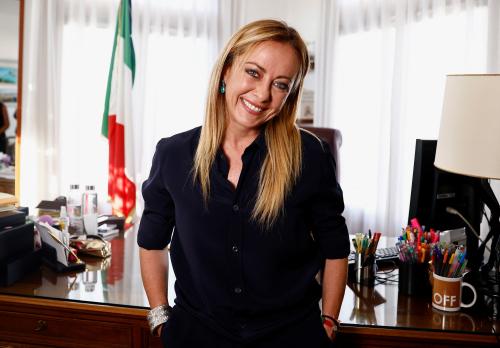
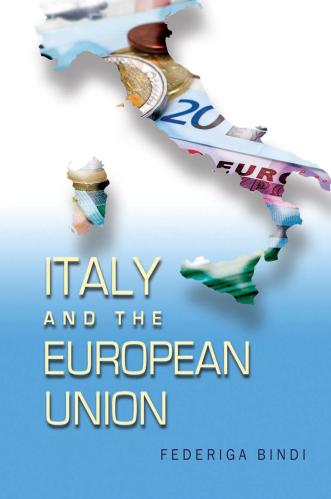
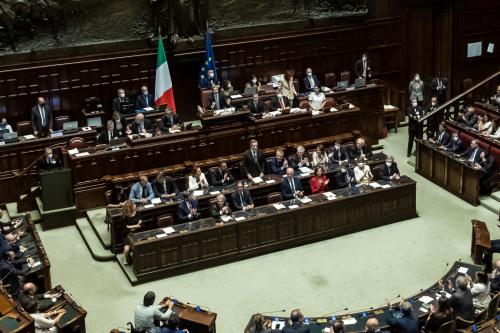
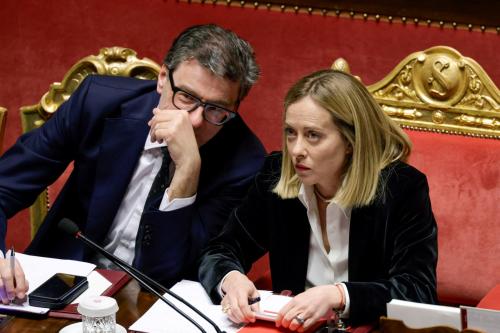
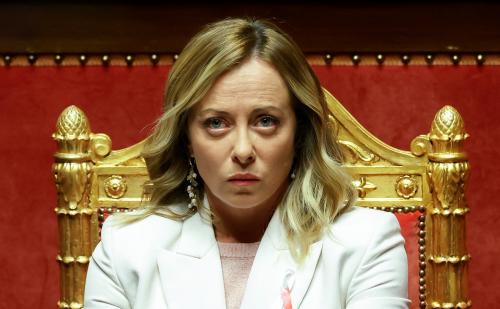

Commentary
Meloni should disavow Trump when she meets Biden
July 25, 2023